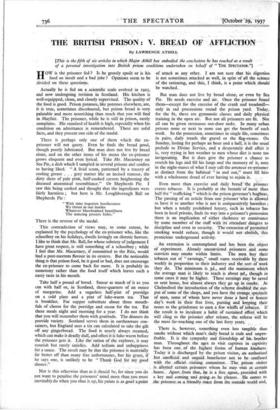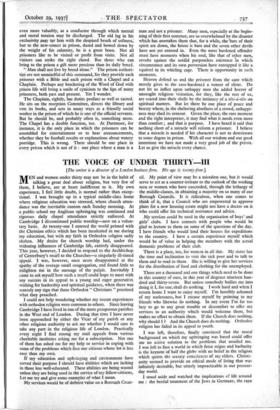THE BRITISH PRISON ; V. BREAD OF AFFLICTION.
By LAWRENCE ATHILL
[•This is the fifth of six articles in which Major Athill has embodied the conclusions he has reached as a result of a personal investigation into British prison conditions undertaken. on behalf of " THE SPECTATOR."] How is the prisoner fed ? Is he grossly spoilt or is his food an insult and a bad joke ? Opinions seem to be divided on these questions.
Actually he is fed on a .scientific scale evolved in 1925, and now undergoing revision in Scotland. His kitchen is well-equipped, clean, and closely supervised. The quality of the food is good. Prison potatoes, like potatoes elsewhere, are, it is true, sometimes discoloured, but prison bread is very palatable and more nourishing than much that you will find in Mayfair. The prisoner, while he is still in prison, rarely complains. His standard of health is high, especially when his condition on admittance is remembered. These are solid facts, and they present one side of the medal.
There' is perhaps only one of them which the ex- prisoner will not query. Even he- finds the bread good, though poorly lubricated. But man does not live by bread alone, and on the other items of his menu the ex-prisoner grows eloquent and even lyrical. Take Mr. Macartney on Sea Pie, a dish which-I sampldd in several prisons and confess to having liked. " A livid scum, patterned by a tracery of cooling grease . . . grey matter like an incised tumour, the dirty dices of pale pink, half-cooked 'carrots heightening the - diseased anatomical resemblance." Or Shepherds Pie. I saw this being cooked and thought that the 'ingredients were fairly harmless ; but here is Mr. Loughborough Ball on Shepherds Pie :
" With time begotten heedlessness We thrust in our insides Whatever bloodstained beastliness The mincing process hides."
There is the reverse of the medal.
This contradiction of views may, to some extent, be' explained by the psychology of the ex-prisoner who, like the schoolboy on his holidays, dwells lovingly on dietetic horrors. I like to think that Mr. Ball, for whose sobriety of judgement I have great respect, is still something of a schoolboy ; while I feel that Mr. Macartney, if committed to the Ritz, would find a post-mortem _flavour in its oysters. But the noticeable thing is that prison food, be it good or bad, does not encourage the ex-prisoner to come back for more.. It is probably its monotony rather than the food itself which leaves such a nasty taste in his mouth.
Take half a pound of bread. Smear as much of it as you can with half or, in Scotland, three-quarters of an ounce of margarine. Add a sugarless half-pint of porridge on a cold plate and a pint of luke-warm tea. That is breakfast. For supper substitute about three mouth- fuls of cheese for the porridge and cocoa for the tea.- Eat these meals night and morning for a year. I do not think that you will remember them with gratitude. The dinners do provide variety. Scotland serves them in earthenware con- tainers, but England uses a tin can calculated to take the gilt off any gingerbread. The food is nearly always steamed, which can make it deadly dull, and often it is luke-warm before the prisoner gets it. Like the ration of the explorer,' it may nourish but rarely satisfies. Add tedium and unhappiness for a sauce. The result may be that the prisoner is materially far better off than many free unfortunates, hut his grace if he says one, is unlikely to be " Thank God fOi my good' dinner."
Nor is this otherwise than as it should be, for since you-do . not want to penalise the prisoners' mind-more than. you must inevitably do when you shut it.up, his palate is as good a point of attack as any other. I am not sure that his digestion is not sometimes attacked as well, in spite of all the science of the rationing, and this, I think, is a point which, should be watched..
But man does not live by bread alone, or even by Sea Pie. He needs exercise and air. -Once the- prisoner found them—except for the exercise of the crank and treadniill- only in sad processions round the prison yard. Today, for the fit, there are gymnastic classes and - daily physical training in the open air. -But not all prisoners- are fit. .Not all can be given strenuous out-door tasks. In many -urban prisons none or next to none can get the benefit. of such work. So the procession, sometimes in single file, sometimes in pairs, daily treads the gravel or the flag-stones. On Sunday, lasting for perhaps an hour and a half, it is the usual prelude to Divine Service, and a desperately dull affair it is, very trying in hot weather to men whose diet is none too invigorating. But it does give the prisoner a chance to stretch his legs and fill his lungs and the memory of it, seen in the night-mares of what I may call the amateur ex-prisoner as distinct frimi the habitual " in and out," must fill him with a wholesome dread of ever having, to rejoin it. • Even more than exercise and daily bread'ilie pnsOner craves tobacco. It is 'probably at the bottoin-Of inoi *than half the " trafficking " which is the prison governor's bugbear, The passing of an article from one prisoner' ho is alkived to have it to another who is not' is coMparatiVely harmless ; but when a totally prohibited luxury, such as tobacco 'has been in local prisons, finds its way into a priSoner's possession there is an implication of either slackness or Connivance by some member of the staff with "its' attendant' dangers to discipline and even to security. -The 'extension of smoking would reduce, though it would ''this pernicious underground activity: An extension is contemplated and has been the. .object Of experiment. Already, unconvicted prisoners and some convicts may smoke within limits. The men buy their tobacco ont. of " earnings,". small sums receivable by, them weekly in proportion to their industry .and :the sort Of work they - do. The minimum is 3d., and the maximum which the average man is likely to reach is about 9d, though in some cases it May be higher. These earnings may be saved or sent home, but alinost always they go up in smoke. At Chelmsford theiritioduction'of the scheme doubled the put of some of the shopi, and you have ihe strange, spectacle of men, some of whom. have never done a hard or honest day's work in • their fire lives, Putting and keeping their noses to the grindstone to earn a few whiffs of tobacco. If the result is to incnicate a habit of sustained effort which will cling to the prisoner, aftei release, the rearm" will be the most far-reaching. one of the last ffirty years.'
There is, however, something even less tangible than smoke without which man's daily bread is stale. and unpro- fitable. It is the sympathy and -friendship. of his ;brother man. Throughout . the ages to visit -captives in • captivity has been one... of- the -highest forms of. human kindness. Today it is discharged by the prison visitor,. an authorised but .unofficial and. unpaid, benefactor not, to be ,.confused with .the.. official.: visiting .committee. - .The prison- visitor allotted certaih..Prisoners whom he may visit at- certain -4.Part-from that, he. is a free ..agent,-provided with a key and curving and going, as he pleases. • He comes to the prisoner. as ,a .friendly,voice from the -outside world-and, even more valuably, as a conductor through which mental and moral tension may be discharged. The old lag in his exclusivity may tar him with the despised brush of sofmess; but to the new-comer in prison, dazed and bowed down by the weight of his calamity, he is a great boon. Not all prisoners like to be visited or profit from visits. Not all visitors can strike the right chord. But those who can bring to the prison a gift more precious than its daily bread.
" Man shall not live by bread alone." The prison authori- ties are not unmindful of this command, for they provide each prisoner with a Bible and each prison with a Chapel and a Chaplain. Perhaps any bracketing of the Word of God with prison life will bring a smile of cynicism to the lips of many prisoners, both past and present. Yet I wonder.
The Chaplain, rightly, has duties profane as well as sacred. He sits on the reception Committee, directs the library and vets its books, and acts in many ways as a friendly social worker in the prison of which he is one of the official servants. But he should be, and probably often is, something more. The Chapel has a double function, too. At Dartmoor, for instance, it is the only place in which the prisoners can be assembled for entertainment or to hear announcements, whether they be football results or explanations about watery porridge. This is wrong. There should be one place in every prison which is not of it : one place where a man is a man and not a prisoner. Many men, especially at the begin- ning of their first sentence, are so overwhelmed by the disaster which -has overtaken them that, for a while, the 'bars of their spirit are down, the house is bare and the seven other devils have not yet entered in. Even the most hardened offender must have moments when his soul, like that of other men, revolts against the sordid purposeless existence in which circumstance and its own perversion have entrapped it like a squirrel in its whirling cage. There is opportunity in such moments.
Heaven defend us and the prisoner from the cant which merely gives to the case-hardened a veneer of slime. Do not let us inflict upon unhappy men the added horror of unsought religious visitation, for they, like the rest of us, are scared into their shells by the intimacy of a tete-a-tete on spiritual matters. But let there be one place of peace and beauty where, in the sheltering aloofness of a crowd, unhappi- ness may shed its armour. Given the place, the rare moment and the right interpreter, it may find what it needs even more than comfort ; and that is purpose. I have heard it said that nothing short of a miracle will reform a prisoner. I believe that a miracle is needed if his character is not to deteriorate to some degree in prison. With all our wisdom and our good intentions we have not made a very good job of the prison. Let us give the miracle every chance.



























































 Previous page
Previous page